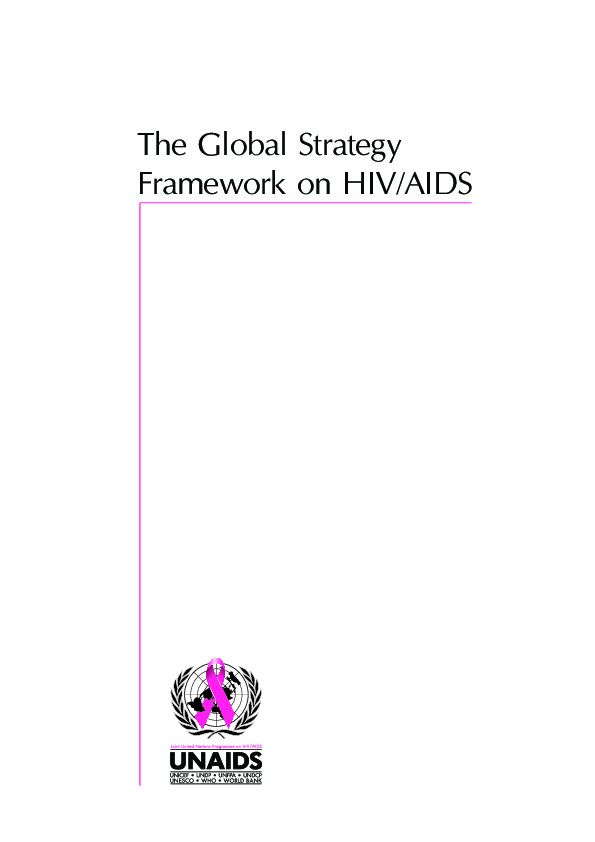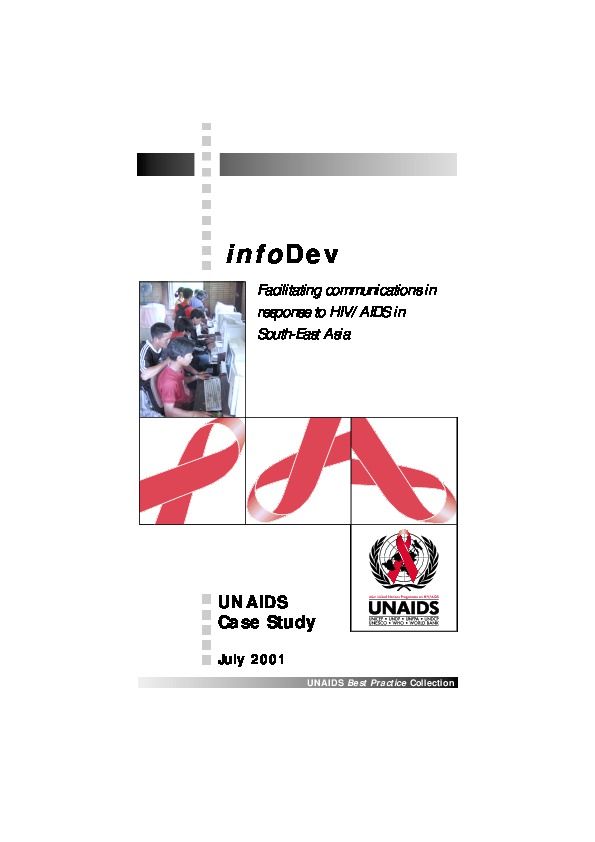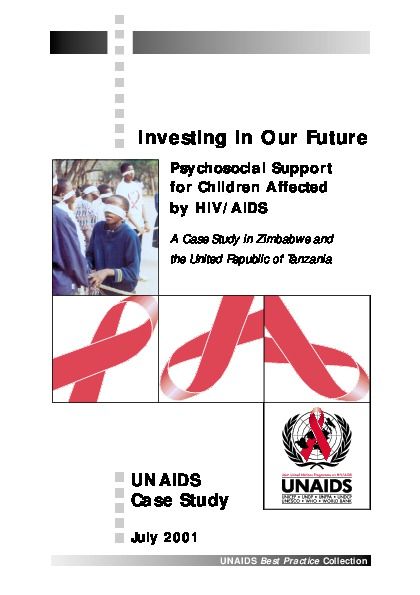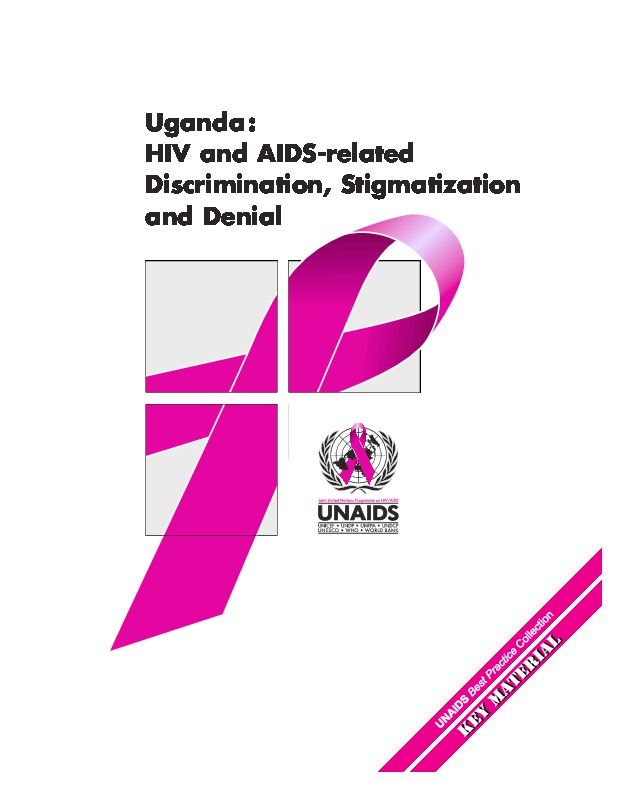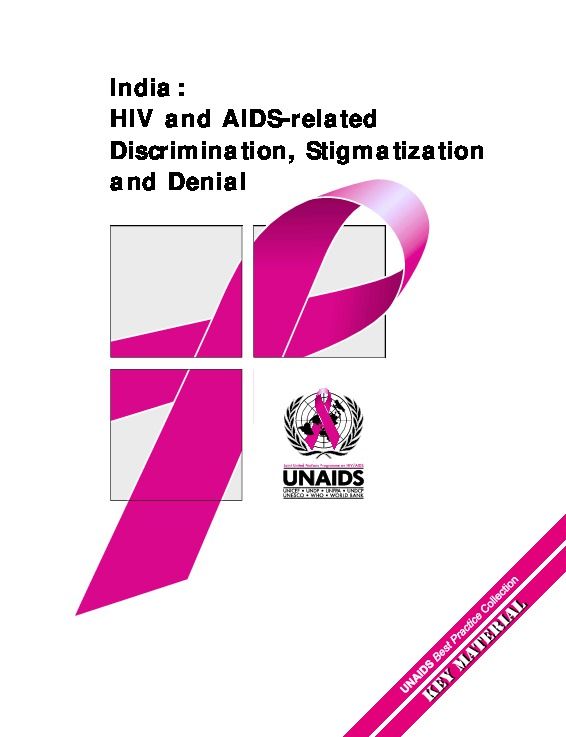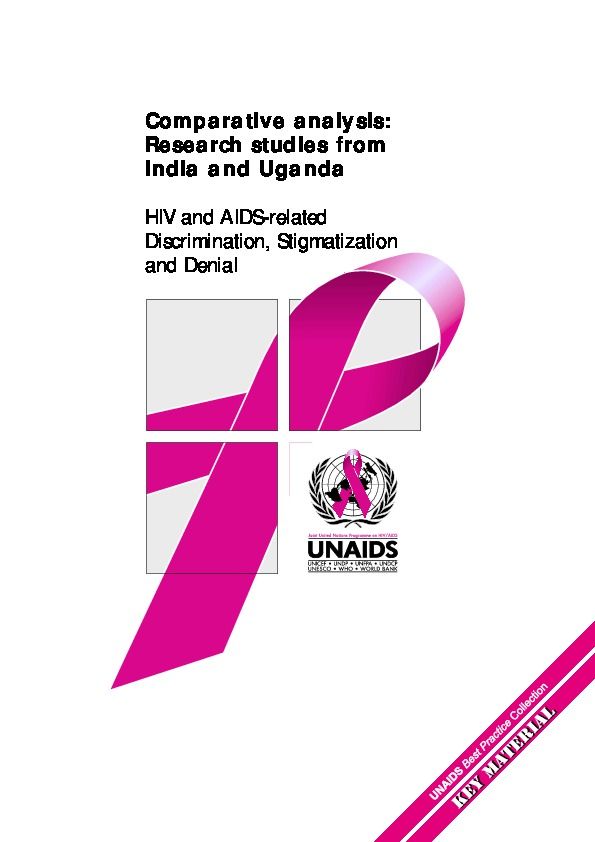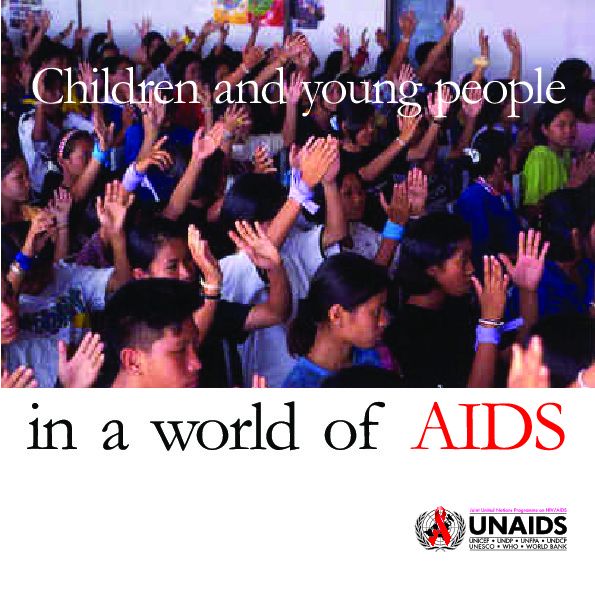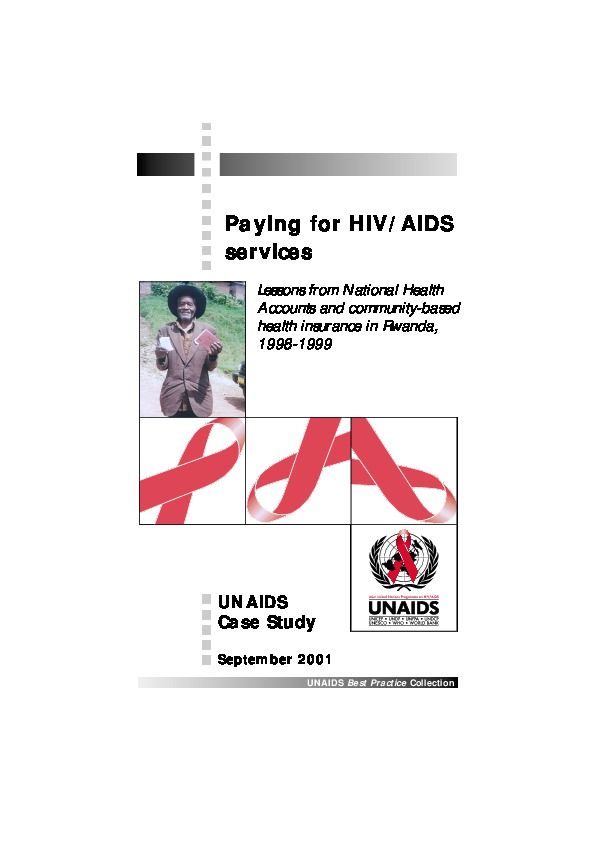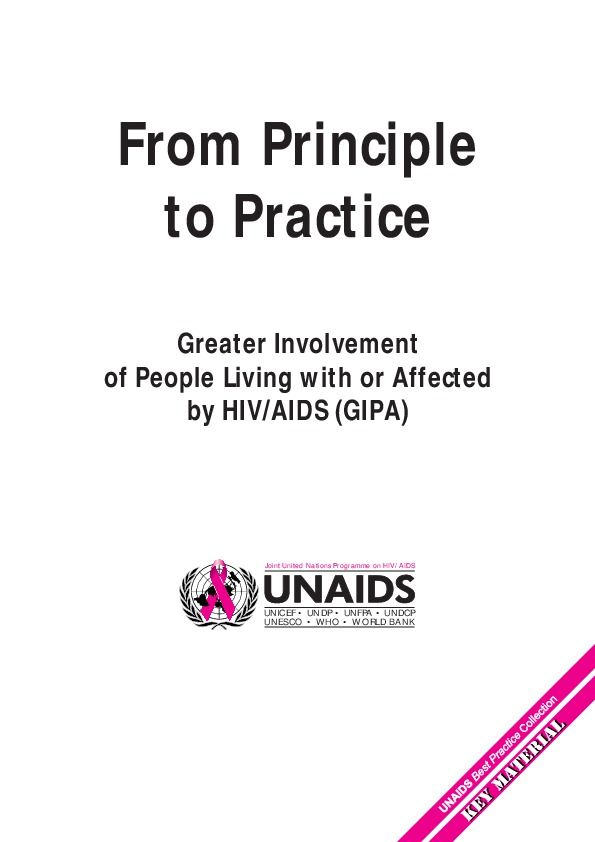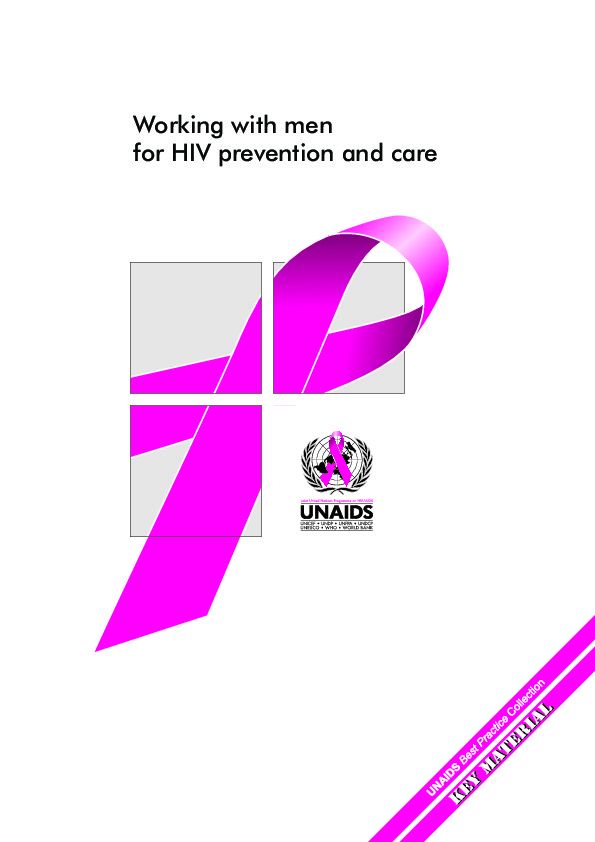Documents
The global strategy framework on HIV/AIDS
02 July 2001
This case study examines the Global Strategy Framework--a set of guiding principles and leadership commitments that form the basis of a successful response to the epidemic. It aims to support communities and countries in reducing their risk and vulnerability to infection, save lives and alleviate human suffering, and lesson the epidemic’s impact on development. It also calls for profound changes in the conduct of community, national and international affairs. The Global Strategy Framework is not a detailed blueprint, so global, national, and community bodies will still need to formulate their own specific strategies concerning particular themes or regions. At the core of the Strategy stands the conviction that tackling the epidemic is an indisputable, global priority, and that an expanded, extraordinary response is not simply necessary, but feasible.
Documents
InfoDev: Facilitating communications in response to HIV/AIDS in South-East Asia
17 July 2001
To support the development of a regional approach to HIV/AIDS, UNAIDS, with funding from the World Bank, has coordinated an infoDev project, focused on increasing e-mail connectivity between strategic allies working in the HIV/AIDS field in South-East Asia. infoDev is a global grant programme managed by the World Bank to promote innovative projects on the use of information and communication technologies (ICTs), with a special emphasis on the needs of the poor in developing countries.
Documents
Investing in our future : psychosocial support for children affected by HIV/AIDs, a case study in Zimbabwe and the United Republic of Tanzania : UNAIDS case study
25 July 2001
This case study, based on years of experience in Zimbabwe and the United Republic of Tanzania, addresses the tough questions related to the rights and needs of children affected by HIV/AIDs, with a focus on their psychosocial needs. It highlights what can be done for the child of an infected parent before and after the parent dies, and advocates for parents living with HIV/AIDs to discuss their status and situation. This report is intended for people concerned about and working with families affected by HIV/AIDs, such as social welfare officers, health care workers and nongovernmental organiyations (NGOs). Through providing examples of successful interventions by organizations in Africa, the report shares the children's experiences to stimulate awareness, and illustrates how collaboration between organizations enables them to address issues they could not tackle alone.
Documents
Uganda : HIV and AIDS-related discrimination, stigmatization and denial
02 August 2001
Discrimination, stigmatization and denial have been recognized as important issues to be addressed in the context of HIV/AIDS. This Key Material describes the findings from a study of the nature, determinants and effects of HIV/AIDS-related discrimination, stigmatization and denial in Uganda. The findings demonstrate the profound consequences of these negative processes for the individuals, families and communities involved. Programmatic and policy issues are also highlighted.
Documents
India : HIV/AIDS related discrimination, stigmatization and denial
29 August 2001
Discrimination, stigmatization and denial have been recognized as important issues to be addressed in the context of HIV/AIDS. This Key Material describes the findings from a study of the nature, determinants and effects of HIV/AIDS-related discrimination, stigmatization and denial in India. The findings demonstrate the profound consequences of these negative processes for the individuals, families and communities involved. Programmatic and policy issues are also highlighted.
Documents
Comparative analysis : research studies from India and Uganda. HIV and AIDS-related discrimination, stigmatization and denial
12 September 2001
Discrimination, stigmatization and denial have been recognized as important issues to be addressed in the context of HIV/AIDS. Discrimination against those living with HIV/AIDS, or presumed to be infected, is a violation of human rights. All individuals deserve equal respect and dignity, whatever their situation and whatever their health status. This Key Material succinctly describes and compares findings from studies, conducted in India and Uganda, of the nature, determinants and effects of HIV/AIDS-related discrimination, stigmatization and denial. The comparative analysis demonstrates the profound consequences of these negative processes for the individuals, families and communities involved. Policy, programmatic and research issues are also highlighted.
Documents
Children and young people in a world of AIDS
27 September 2001
Around the world, HIV/AIDs is shattering millions of children and young peoples' opportunities for healthy adult lives. Nevertheless, it is young people who offer the greatest hope for changing the course of the epidemic. In June 2001, the United Nations General Assembly Special Session on HIV/AIDs adopted the 'Declaration of Commitment on HIV/AIDS'--a comprehensive global workplan to beat HIV/AIDS, which focuses on the needs and rights of young people and children. This report examines the Declaration and its intention with regard to preventing mother-to-child transmission, providing care for children affected by AIDS, and protecting young people against the epidemic, as well as the time frames for the achievement of these critical goals.
Documents
Paying for HIV/AIDS services : lessons from National Health Accounts and community-based health insurance in Rwanda, 1998 – 1999 : UNAIDS case study
09 October 2001
This case study focuses on the development and implementation of prepayment insurance schemes for HIV/AIDS-related health care services in Rwanda. Based on an analysis of National Health Accounts, and developed by the Rwandan Government, the system was introduced to ensure that the growing numbers of rural poor had access to modern health care facilities. The study examines the proportion of health-related expenditures by government, donors and patients on the prevention and treatment of HIV/AIDS, detailing the impact on households, and suggesting ways to decrease the financial burden of HIV on the seropositive poor. Issues of effectiveness, ethical soundness, relevance and equity within the HIV-positive population are also explored.
Documents
Working with men in HIV prevention and care
31 October 2001
Throughout the course of the HIV/AIDS epidemic, the role gender relations play in the spread of the virus has gained increasing recognition. For example, women worldwide are less likely than men to be able to control whether, when and how sex takes place. It is also becoming clearer that women cannot change prevailing gender relations without the support of their male partners. Thus, engaging men is a critical component in HIV/AIDS prevention. This document helps those working with men, specifically in the field of HIV prevention, as well as more broadly in the areas of improved sexual and reproductive health. It examines 12 diverse projects, including Project Papai, which works with young men in Recife, Brazil to promote participation in health, education and child-rearing. It is believed that an analysis of their strategies and lessons learned would generate common ground on men’s needs in association with HIV/AIDS and their general health, and would provide insights into effective approaches for working with men.

